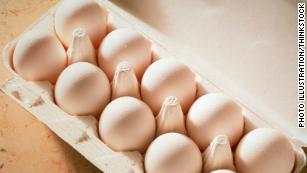In the past, doctors sometimes warned patients to avoid eating too many eggs.
Though eggs contain high-quality protein and other positive nutritional components, they also have high amounts of cholesterol, which was thought might be harmful, explained Canqing Yu, a co-author of the study and an associate professor in the Peking University School of Public Health in Beijing.
Yet "existing studies on the association between egg and cardiovascular diseases are controversial due to small sample size and limited information," Yu wrote in an email. Past studies have provided only limited evidence from the Chinese population, "which have huge differences in dietary habits, lifestyle behaviors and diseases patterns," Yu said.
These are among the reasons why he and his colleagues decided to investigate the relationship between eating eggs and cardiovascular disease.
To begin, they used information from an ongoing study of half a million adults living in 10 regions of China. They concentrated on 416,213 participants who'd never been diagnosed with cancer, cardiovascular disease or diabetes.
Slightly more than 13% of these adults, ranging in age from 30 to 79, said they ate about an egg a day while just over 9% reported never or very rarely enjoying an egg. Nearly all the participants ate chicken, not duck, eggs, Yu noted.
Over nearly nine years, the research team tracked this select group. They focused on major coronary events, such as heart attacks and strokes, including hemorrhagic strokes -- when a blood vessel bursts in the brain due, usually, to uncontrolled high blood pressure -- and ischemic strokes -- when a blood vessel feeding the brain becomes blocked, usually by a blood clot.
"Cardiovascular diseases are the leading cause of deaths in China, which accounted for half of the total mortality," Yu said. "Stroke, including hemorrhagic and ischemic stroke, is the first cause of premature death, followed by ischemic heart disease."
During follow-up, 9,985 people died of cardiovascular disease, and an additional 5,103 major coronary events occurred. Nearly 84,000 other participants were diagnosed with heart disease in this time period.
Analyzing the data, the researchers found that eating about an egg a day related to a lower risk of heart disease compared with not eating eggs.
In fact, participants who ate up to one egg daily had a 26% lower risk of hemorrhagic stroke, which is more common in China than in the United States or other high-income countries. Additionally, the egg eaters had a 28% lower risk of dying from this type of stroke.
Finally, egg eaters also enjoyed a 12% reduced risk of ischemic heart disease, which is diagnosed in those who show the early signs of gridlocked blood flow to the brain.
Based on the results, Yu said, eating eggs in moderation -- less than one a day -- is associated with a lower incidence of cardiovascular diseases, especially hemorrhagic stroke. Even more, the new research is "by far the most powerful project to detect such an effect," he said.
On the downside, the research team collected only "crude information" about egg consumption from participants, and this prevented them from estimating effects "more precisely," Yu said. "We should [also] be cautious when interpreting our results in a context of different dietary and lifestyle characteristics from China."
for more info click here


No comments:
Post a Comment